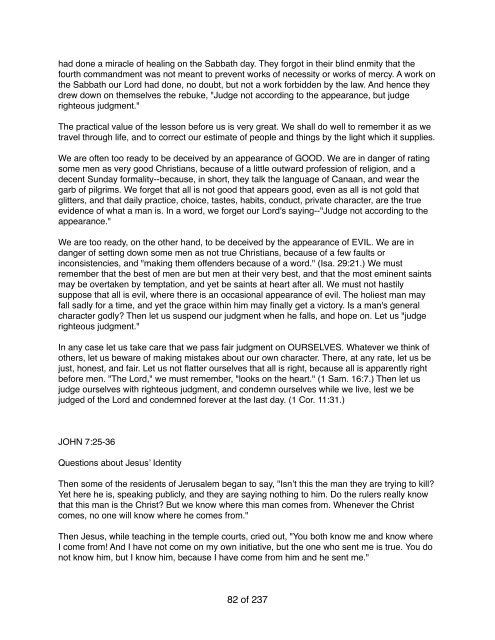J. C. Ryle John
John Charles Ryle (May 10, 1816 - June 10, 1900) was an evangelical Anglican clergyman and first Bishop of Liverpool. He was renowned for his powerful preaching and extensive tracts.
John Charles Ryle (May 10, 1816 - June 10, 1900) was an evangelical Anglican clergyman and first Bishop of Liverpool. He was renowned for his powerful preaching and extensive tracts.
Create successful ePaper yourself
Turn your PDF publications into a flip-book with our unique Google optimized e-Paper software.
had done a miracle of healing on the Sabbath day. They forgot in their blind enmity that the<br />
fourth commandment was not meant to prevent works of necessity or works of mercy. A work on<br />
the Sabbath our Lord had done, no doubt, but not a work forbidden by the law. And hence they<br />
drew down on themselves the rebuke, "Judge not according to the appearance, but judge<br />
righteous judgment."<br />
The practical value of the lesson before us is very great. We shall do well to remember it as we<br />
travel through life, and to correct our estimate of people and things by the light which it supplies.<br />
We are often too ready to be deceived by an appearance of GOOD. We are in danger of rating<br />
some men as very good Christians, because of a little outward profession of religion, and a<br />
decent Sunday formality--because, in short, they talk the language of Canaan, and wear the<br />
garb of pilgrims. We forget that all is not good that appears good, even as all is not gold that<br />
glitters, and that daily practice, choice, tastes, habits, conduct, private character, are the true<br />
evidence of what a man is. In a word, we forget our Lord's saying--"Judge not according to the<br />
appearance."<br />
We are too ready, on the other hand, to be deceived by the appearance of EVIL. We are in<br />
danger of setting down some men as not true Christians, because of a few faults or<br />
inconsistencies, and "making them offenders because of a word." (Isa. 29:21.) We must<br />
remember that the best of men are but men at their very best, and that the most eminent saints<br />
may be overtaken by temptation, and yet be saints at heart after all. We must not hastily<br />
suppose that all is evil, where there is an occasional appearance of evil. The holiest man may<br />
fall sadly for a time, and yet the grace within him may finally get a victory. Is a man's general<br />
character godly? Then let us suspend our judgment when he falls, and hope on. Let us "judge<br />
righteous judgment."<br />
In any case let us take care that we pass fair judgment on OURSELVES. Whatever we think of<br />
others, let us beware of making mistakes about our own character. There, at any rate, let us be<br />
just, honest, and fair. Let us not flatter ourselves that all is right, because all is apparently right<br />
before men. "The Lord," we must remember, "looks on the heart." (1 Sam. 16:7.) Then let us<br />
judge ourselves with righteous judgment, and condemn ourselves while we live, lest we be<br />
judged of the Lord and condemned forever at the last day. (1 Cor. 11:31.)<br />
JOHN 7:25-36<br />
Questions about Jesus’ Identity<br />
Then some of the residents of Jerusalem began to say, "Isn’t this the man they are trying to kill?<br />
Yet here he is, speaking publicly, and they are saying nothing to him. Do the rulers really know<br />
that this man is the Christ? But we know where this man comes from. Whenever the Christ<br />
comes, no one will know where he comes from."<br />
Then Jesus, while teaching in the temple courts, cried out, "You both know me and know where<br />
I come from! And I have not come on my own initiative, but the one who sent me is true. You do<br />
not know him, but I know him, because I have come from him and he sent me."<br />
82 of 237




